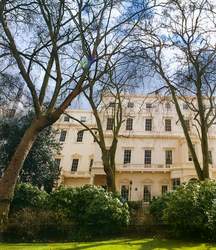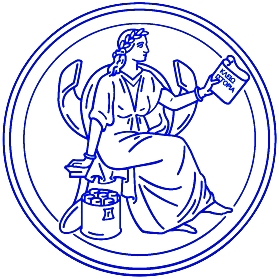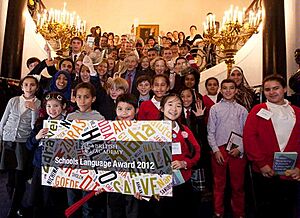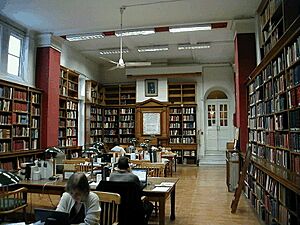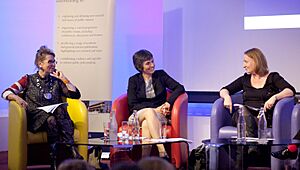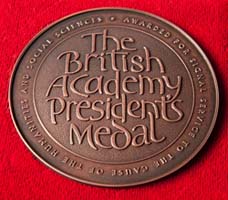British Academy facts for kids
 |
|
| Formation | 1902 |
|---|---|
| Type | National academy |
| Legal status | Charity |
| Headquarters | London, England |
|
Membership
|
1,500 |
|
President
|
Julia Black |
The British Academy is the United Kingdom's main group for subjects like history, philosophy, and social sciences. These are often called the humanities and social sciences. It was started in 1902 and helps leading experts in these fields.
The Academy supports research projects all over the UK. It is a charity that runs itself and is based in London. The British Academy mostly gets its money from government grants. For example, in 2022, most of its funding came from a government department. This money helps it do its important work.
Contents
What the British Academy Does
The British Academy has five main goals:
- To speak up for the humanities and social sciences. This means making sure these subjects are valued.
- To support the best researchers and their projects. They invest in smart people and new ideas.
- To help people understand big questions about society. They share knowledge to make debates better.
- To work with people and groups around the world. This helps share ideas across countries.
- To make sure the Academy stays strong for the future. They manage their resources wisely.
A Look at Its History
The idea for the British Academy came about in 1899. People wanted Britain to have a group that could join meetings with other academies in Europe and America. The Academy officially started in 1901 and received its special permission from King Edward VII in 1902.
Since then, many famous British scholars have been part of the Academy. These include well-known thinkers like John Maynard Keynes and C. S. Lewis.
For many years, the Academy did not have its own building. It moved to different places in London over time. In 1998, it moved to its current home at 10–11 Carlton House Terrace. This building overlooks St James's Park. Number 11 was once the home of William Ewart Gladstone, a former Prime Minister.
In 2010, the Academy worked to make its buildings even better. They connected the two buildings and added new spaces, including a large auditorium. These spaces are used for Academy events and can also be rented out.
Who Are the Fellows?
Being chosen as a Fellow of the British Academy is a big honor. It means someone is a very distinguished scholar in the humanities or social sciences. They are recognized for their published work. Fellows can use the letters FBA after their names.
Fellows are chosen for their work in many different areas, such as:
- Humanities: This includes subjects like history, languages, art, music, and philosophy.
- Social Sciences: This covers areas like law, economics, psychology, and education.
Helping Research with Funding
The British Academy provides a lot of money to support research in the humanities and social sciences. This funding helps scholars at different stages of their careers. They offer fellowships for new researchers and grants for bigger projects.
The Academy gets money from the government and also from private donations. In 2014/15, it received about £30 million to support research. They get many applications for funding each year. For example, they received around 3,600 applications and made 588 awards to scholars across the UK.
Working with Other Countries
The Academy works to connect UK research with scholars around the world. They help create ways for people to work together internationally. They also use their knowledge to help solve global challenges.
The Academy supports a network of research institutes in other countries. These institutes help UK scholars who are doing research abroad. Some of these are in places like Amman, Ankara, Athens, and Rome.
Supporting Higher Education
As the main voice for the humanities and social sciences in the UK, the British Academy works to protect and promote these subjects. They talk to the government and other groups about important issues in higher education and research. They also hold events and discussions to share ideas.
Policy Work
The experts in the British Academy use their knowledge to help with important policy issues. They aim to provide clear and objective insights on complex topics. This work helps inform decisions about public policy, education, and research. The Academy offers a place for discussing issues that are important for society.
Public Events
The British Academy holds many public events each year. These include lectures, discussions, and conferences. They showcase new research and debate current topics. Most of these events are free and take place at the Academy's headquarters in London. One famous event is the Shakespeare Lecture, which started in 1911.
Awards and Prizes
The British Academy gives out 15 different prizes and medals. Most of these are awarded every year. These awards recognize outstanding achievements in the humanities and social sciences.
Some of the awards include:
- The British Academy President's Medal, for great service to these subjects.
- The British Academy Medal, for important academic achievements.
- The Leverhulme Medal and Prize.
- The British Academy Book Prize for Global Cultural Understanding.
Leaders of the British Academy
Many important scholars have served as President of the British Academy. The current President is Julia Black, who started her term in 2021.
Images for kids
See also
 In Spanish: Academia Británica para niños
In Spanish: Academia Británica para niños


